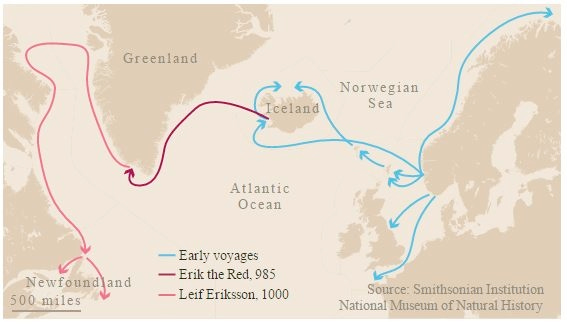"It's my boat, and the Gods love my boat!" - Floki
Gustaf Skarsgård plays Floki in the wildly successful “Vikings” TV Series of 2013–20.
"Vikings transports us to the brutal and mysterious world of Ragnar Lothbrok, a Viking warrior and farmer who yearns to explore - - and raid - - the distant shores across the ocean." - The Vikings
Floki is an odd fellow and a friend of Ragnar. In the series, Floki revolutionizes shipbuilding, allowing the Vikings to sail further and faster than ever before. The vastly superior Viking longboat - - the very symbol of the Viking people - - was perfected at a time when other cultures were uninterested in seafaring and their technologies and skills had gone stale.
The Vikings - - through their "Flokis" - - made a number of technological leaps during this period. First, they pioneered a method of assembling the side planks used to create their vessels, now called the "clinker method". In this method, the ship planks overlap on the sides and are not butted edge-to-edge as was tradition. This made the Viking boats both stronger and more flexible, enabling them to better ride rough seas.
"I can tell which trees will make the best planks just by looking at them … I can look inside the tree." - Floki
The second leap was even more spectacular.
Viking sailors crossed the Atlantic and settled in North America five centuries before Columbus' famous voyage!
To do this, the Vikings used a couple of advanced navigational tools. In 1948 an archeologist found the Uunartoq disc in a Greenland homestead, an example of a Viking "sun compass". This compass uses a pin in a wooden disk, like a sundial, and can tell the navigator his position in relationship to the Earth's equator, his latitude. With this tool, one could sail west from Europe to Greenland and make the return voyage, sailing east from Greenland back to Europe. But what do you do when you can't see the sun, when the sky is overcast?
Many early texts and sagas describe the use of a mineral crystal, the Viking Sunstone, through which a navigator could locate the sun behind clouds. The mineral, Icelandic spar, polarizes sunlight when held up to the light. Many insects, including bees, use this method of polarizing sunlight to determine direction. Recently, scientists used computer simulations to study the effectiveness of sailing with a Viking sun disk and sunstone, determining the tools extremely effective, even in a wide variety of seasons, times of day, and weather conditions. This explains how the Vikings ruled the North Atlantic Ocean for 300 years without a magnetic compass!
How You Treat Your Flokis Makes Your Society, for Better or Worse
Floki was eccentric, maybe you'd say "strange". He believed himself to be descended from the Vikings' trickster god Loki. He was often awkward, sometimes abrasive, and frequently obtuse. He was also brilliant, insightful, and perceptive - - an extraordinarily gifted shipbuilder. All of these things made Floki. A package.
He was loved by his friends, his village, his tribe, and his people. Some communities merely tolerated their "weirdos", giving them elbow room; others, as in Floki's case, gave them resources and praise, creating a hothouse of innovation. In many other places in the world, at this same time, other "Flokis" were being exiled, stoned to death, perhaps even eaten!
Take a look at your own social circle, take a look at your own organization, and ask yourself, "How are we treating our Flokis?"
Can you spot the “Flokis” in my previous post, Golden Flops and Waves?
You Might Not See It, But You Too Need Your Flokis
When you think of "military", what is the picture in your mind? You might use military-type words to describe it - - regimented, marshalled, commanded - - images of things very ordered, controlled, and disciplined. This impression, though, is usually far from the reality of conflict; the environment - - as we witness in Eastern Europe and the Middle East today - - is chaotic, fluid, and unpredictable. Tremendous innovation is occurring in conflicts today, as each new technology and tactic is met with countermeasures, and the cycle continues over and over. Innovation is more prized than ever on the modern battlefield.
All of our largest and most critical fields are crying out for more innovation; healthcare and education immediately come to mind. Whatever your station, whatever your industry or calling, innovation is key in your competitive, global, and increasingly high-cost world.
Cultivate a Floki-Friendly Environment = More Innovation at Every Level
How might you start? The most important thing to do is to revisit your mission. What, and why, exactly, are you trying to accomplish? What is MOST important?
Next ask, what am I trying to control that lies outside the scope of that mission? You might not think you are trying to control a lot, but you are. Every organization has hundreds of "road lines" one is not meant to cross, be they customs, norms, procedures, expectations, etc. In a previous post, Off with the Head!, I describe the Jeds and discuss how following a super-simple, mission-serving ruleset, and throwing everything else out the window, might enable highly-effective innovation.
Where do you see road lines in your own organization? Are they serving the mission, or might they be counter-productive, perhaps driving the Flokis away?
Most Organizations Have Inertia to Less Innovation, Unless Someone Intervenes
Studies have demonstrated, for example, that social media use leads to more conformity, not more individuality. Yes, social media leads to fewer Flokis! With technology, norms and expectations are shared more broadly and quickly than ever before. You see the impacts in clothing, behavior, even in the design of spaces - - the Starbucks in Beijing look very much like the ones in New York City, even in the appearance of the customers! People conform due to fear of being labelled "weird" by fellow users. We face more pressure than ever to conform, and this is everywhere in life - - precisely the enemy of innovation.
Could you introduce some "weirdness" into your organization, your workplace, your home? It might be as simple as "crazy shirt day", for a start.
Great Leaders Foster Innovation-Friendly Environments
It's important to look across the organization, and top to bottom. Do you prize hiring certain personality types over others? Do you use personality assessments to do this? Are these helping the mission, or are they vestigial, ill-suited to your current environment? These practices can lead to high conformity and a dearth of cognitive diversity.
I'm always let down when I see companies highlighting their "diversity" statistics and charts. Typically, they detail a small set of qualities, usually inalienable, like the color of one's skin and where they were born. Rare is any mention or measure of any ideological or cognitive variability. You'd learn more about a company's diversity if you saw, say, that no two people liked the same music or type of cuisine. What use is it to you, if everyone in your organization shares the same view, the same mindset? None. I speak of this in my post, Stop Reading Me!. Seek to make your organization diverse in thought, approach, and opinion as well.
I've so much more to say on these topics, enough to fill many more posts. I'll leave you with a final thought and that is, Finding the right balance between conformity and eccentricity, between uniformity and (true) diversity, is a key leadership challenge.
Do you have other thoughts on how to foster diversity in thought, approach, and opinion? Please share in the comments below.







